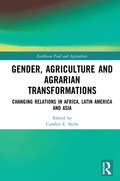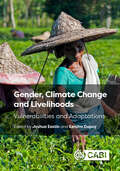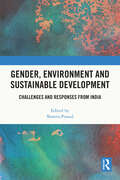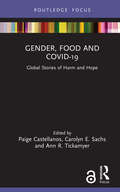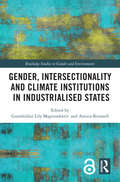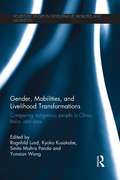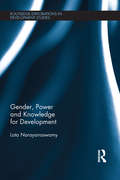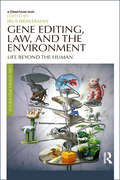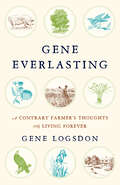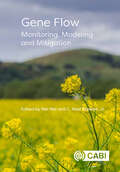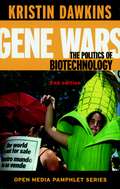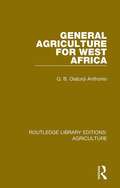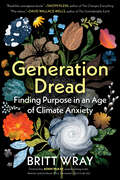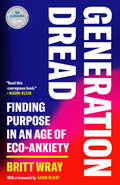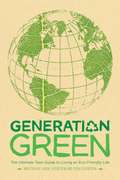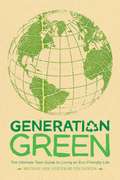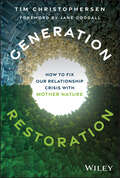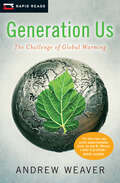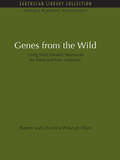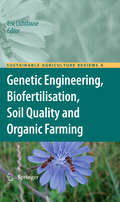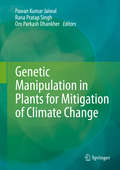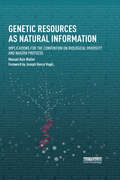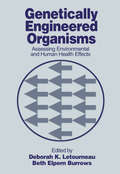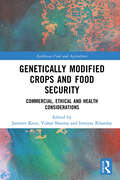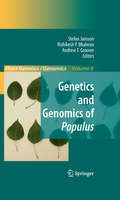- Table View
- List View
Gender, Agriculture and Agrarian Transformations: Changing Relations in Africa, Latin America and Asia (Earthscan Food and Agriculture)
by Carolyn E. SachsThis book presents research from across the globe on how gender relationships in agriculture are changing. In many regions of the world, agricultural transformations are occurring through increased commodification, new value-chains, technological innovations introduced by CGIAR and other development interventions, declining viability of small-holder agriculture livelihoods, male out-migration from rural areas, and climate change. This book addresses how these changes involve fluctuations in gendered labour and decision making on farms and in agriculture and, in many places, have resulted in the feminization of agriculture at a time of unprecedented climate change. Chapters uncover both how women successfully innovate and how they remain disadvantaged when compared to men in terms of access to land, labor, capital and markets that would enable them to succeed in agriculture. Building on case studies from Africa, Latin America and Asia, the book interrogates how new agricultural innovations from agricultural research, new technologies and value chains reshape gender relations. Using new methodological approaches and intersectional analyses, this book will be of great interest to students and scholars of agriculture, gender, sustainable development and environmental studies more generally.
Gender, Climate Change and Livelihoods: Vulnerabilities and Adaptations
by Margaret Alston Salim Momtaz Elizabeth Bryan Muhammad Asaduzzaman Nahid Rezwana Aden Aw-Hassan Elisabeth Garner Patricia E. Perkins Agnes Babugura Bipasha Baruah Abderrahim Bentaibi Quinn Bernier Yvonne Braun Boubaker Dhehibi Diana Hummel Zobaidul Kabir Edward Kato Francis Mwesigye Dina Najjar Balikisu Osman Elizabeth Opiyo Onyango Shahreen ShehwarThis book applies a gendered lens to evaluate the dynamic linkages between climate change and livelihoods in developing countries. It examines how climate change affects women and men in distinct ways, and what the implications are for earning income and accessing the natural, social, economic, and political resources required to survive and thrive. The book's contributing authors analyze the gendered impact of climate change on different types of livelihoods, in distinct contexts, including urban and rural, and in diverse geographic locations, including Asia, Africa and the Caribbean. It focuses on understanding how public policies and power dynamics shape gendered vulnerabilities and impacts, how gender influences coping and adaptation mechanisms, and how civil society organizations incorporate gender into their climate advocacy strategies. This book: -Provides cutting-edge scholarship on an underrepresented area of climate change: the gendered impacts of climate change on livelihoods. -Covers a range of different types of livelihoods and geographic locations. -Involves contributors from a diverse array of cultural and scholarly backgrounds, bringing contrasting perspectives to the topic. This book is recommended for scholars, students, and practitioners who study or work in fields such as climate change, gender, livelihoods, public policy, economic development, and agriculture.
Gender, Environment and Sustainable Development: Challenges and Responses from India
by Shweta PrasadThis book studies environment and sustainable development from the perspective of gender. It focuses on three major themes, including sustainability of development practices, policy perspectives on environmental management and climate change and its gendered impact. It includes contributions from academicians working across disciplines and practitioners working at the grassroots levels. The book addresses issues facing India amid a growing global environmental crisis and suggests policy measures for environmental protection and to improve the quality of life of its inhabitants. Lucid and topical, the volume will be an indispensable resource for students, researchers of gender, environment and sustainable development, sociology and public policy. It will also be a great resource for advocacy groups, non-governmental organisations (NGOs) and policymakers working in the area.
Gender, Food and COVID-19: Global Stories of Harm and Hope (Routledge Focus on Environment and Sustainability)
by Paige Castellanos, Carolyn E. Sachs and Ann R. TickamyerThis book documents how COVID-19 impacts gender, agriculture, and food systems across the globe with on-the-ground accounts and personal reflections from scholars, practitioners, and community members. During the coronavirus pandemic with many people under lockdown, continual agricultural production and access to food remain essential. Women provide much of the formal and informal work in agriculture and food production, distribution, and preparation often under precarious conditions. A cadre of scholars and practitioners from across the globe provide their timely observations on these issues as well as more personal reflections on its impact on their lives and work. Four major themes emerge from these accounts and are interwoven throughout: the pervasiveness of food insecurity, the ubiquity of women’s care work, food justice, and policies and research that can that can result in a resilience that reimagines the future for greater gender and intersectional equality. We identify what lessons we can learn from this global pandemic about research and practices related to gender, food, and agricultural systems to strive for more equitable arrangements. This book will be of great interest to students, scholars and practitioners working on gender and food and agriculture during this global pandemic and beyond.
Gender, Intersectionality and Climate Institutions in Industrialised States (Routledge Studies in Gender and Environments)
by Gunnhildur Lily Magnusdottir and Annica KronsellThis book explores how climate institutions in industrialized countries work to further the recognition of social differences and integrate this understanding in climate policy making. With contributions from a range of expert scholars in the field, this volume investigates policy-making in climate institutions from the perspective of power as it relates to gender. It also considers other intersecting social factors at different levels of governance, from the global to the local level and extending into climate-relevant sectors. The authors argue that a focus on climate institutions is important since they not only develop strategies and policies, they also (re)produce power relations, promote specific norms and values, and distribute resources. The chapters throughout draw on examples from various institutions including national ministries, transport and waste management authorities, and local authorities, as well as the European Union and the UNFCCC regime. Overall, this book demonstrates how feminist institutionalist theory and intersectionality approaches can contribute to an increased understanding of power relations and social differences in climate policy-making and in climate-relevant sectors in industrialized states. In doing so, it highlights the challenges of path dependencies, but also reveals opportunities for advancing gender equality, equity, and social justice. Gender, Intersectionality and Climate Institutions in Industrialized States will be of great interest to students and scholars of climate politics, international relations, gender studies and policy studies.
Gender, Mobilities, and Livelihood Transformations: Comparing Indigenous People in China, India, and Laos (Routledge Studies in Development, Mobilities and Migration)
by Kyoko Kusakabe Ragnhild Lund Smita Mishra Panda Yunxian WangIn the era of globalization many minority populations are subject to marginalization and expulsion from their traditional habitats due to rapid economic restructuring and changing politico-spatial relations. This book presents an analytical framework for understanding how mobility is an inherent part of such changes. The book demonstrates how current neoliberal policies are making people increasingly on the move – whether voluntarily or forced, and whether individually, as family, or as whole communities – and how such mobility is changing the livelihoods of indigenous people, with particular focus on how these transformations are gendered. It queries how state policies and cross-border and cross-regional connections have shaped and redefined the livelihood patterns, rights and citizenship, identities, and gender relations of indigenous peoples. It also identifies the dynamic changes that indigenous men and women are facing, given rapid infrastructure improvements and commercialization and/or industrialization in their places of Environment. With a focus on mobility, this innovative book gives students and researchers in development studies, gender studies, human geography, anthropology and Asian studies a more realistic assessment of peoples livelihood choices under a time of rapid transformation, and the knowledge produced may add value to present development policies and practices.
Gender, Power and Knowledge for Development (Routledge Explorations in Development Studies)
by Lata NarayanaswamyKnowledge-for-development is under-theorised and under-researched within development studies, but as a set of policy objectives it is thriving within development practice. Donors and other agencies are striving to improve the flow of information within and between decision-makers and so-called ‘poor and marginalized groups’ in order to promote economic and social development, including the empowerment of women. Gender, Power and Knowledge for Development questions the assumptions and practice of the knowledge-for-development industry. Using a qualitative, multi-site ethnographical study of a Northern-based gender information service and its ‘beneficiaries’ in India, the book queries the utility of the knowledge paradigm itself and the underlying assumption that a knowledge deficit exists in the Global South. It questions the value of practices designed to address this presumed deficit that seek to increase information without addressing the specific problems of the knowledge systems being targeted for support. After reviewing the evidence, the book recommends that international organisations, governments and practitioners move away from the belief that information intermediaries can employ progressive correctives to ‘tinker at the edges’ and thus resolve the shortcomings of on-going attempts to use knowledge alone as a driver of development. Gender, Power and Knowledge for Development will be of great interest to researchers, students in development studies, gender studies, and communication studies as well as INGOs, donor agencies and groups engaged in information for development (i4D), ICT for development (ICT4D), Tech4Dev, knowledge mobilization and knowledge-for-development (K4D).
Gene Editing, Law, and the Environment: Life Beyond the Human (Law, Science and Society)
by Irus BravermanTechnologies like CRISPR and gene drives are ushering in a new era of genetic engineering, wherein the technical means to modify DNA are cheaper, faster, more accurate, more widely accessible, and with more far-reaching effects than ever before. These cutting-edge technologies raise legal, ethical, cultural, and ecological questions that are so broad and consequential for both human and other-than-human life that they can be difficult to grasp. What is clear, however, is that the power to directly alter not just a singular form of life but also the genetics of entire species and thus the composition of ecosystems is currently both inadequately regulated and undertheorized. In Gene Editing, Law, and the Environment, distinguished scholars from law, the life sciences, philosophy, environmental studies, science and technology studies, animal health, and religious studies examine what is at stake with these new biotechnologies for life and law, both human and beyond.
Gene Everlasting: A Contrary Farmer's Thoughts on Living Forever
by Gene LogsdonAuthor Gene Logsdon—whom Wendell Berry once called &“the most experienced and best observer of agriculture we have&”—has a notion: That it is a little easier for gardeners and farmers to accept death than the rest of the populace. Why? Because every day, farmers and gardeners help plants and animals begin life and help plants and animals end life. They are intimately attuned to the food chain. They understand how all living things are seated around a dining table, eating while being eaten. They realize that all of nature is in flux.Gene Everlasting contains Logsdon&’s reflections, by turns both humorous and heart-wrenching, on nature, death, and eternity, all from a contrary farmer&’s perspective. He recounts joys and tragedies from his childhood in the 1930s and &‘40s spent on an Ohio farm, through adulthood and child-raising, all the way up to his recent bout with cancer, always with an eye toward the lessons that farming has taught him about life and its mysteries.Whether his subject is parsnips, pigweed, immortality, irises, green burial, buzzards, or compound interest, Logsdon generously applies as much heart and wit to his words as he does care and expertise to his fields.
Gene Flow: Monitoring, Modeling and Mitigation
by Wei Wei And C. Neal Stewart JrGene flow is a natural process that occurs spontaneously and enables the evolution of life. However, with the release of genetically modified organisms, concerns have focused on introduced foreign transgenes and their dispersal in nature through gene flow. This book examines gene flow of transgenes, such as herbicide resistance genes, with the goal of understanding the factors that may affect the process of gene flow. A greater biological understanding is essential to make sound management regulatory decisions when also taking into consideration the processes that happen in conventional plants. Monitoring, modelling, and mitigation are the three most closely related elements of gene flow. The book includes both scientific reviews and perspectives on gene flow and experimental case studies, including studies of gene flow in soybean and poplar. The authors present diverse views and research methodologies to understand transgene flow. This book: Focuses on applications of gene flow (monitoring, modelling, and mitigation); Includes both review chapters and case studies; Is written by international team of scientists currently working in gene flow. This book will be valuable for students and researchers in genetics, biotechnology, plant science, and environmental science. It also provides key insights of value to regulators of biotechnology as well as policy-makers.
Gene Wars: The Politics of Biotechnology (Open Media Series)
by Kristin DawkinsDespite technological advances, an alarming number of people in the world go hungry. Even more chilling is the fact that in the future that number will likely increase. In this book, Kristin Dawkins discusses the international policies that are shaping this future, including those that govern the genetic engineering of plants. Dawkins shows how a diversified gene pool is crucial to food production - and how corporate control of the gene pool threatens our collective security.Behind these issues lies the specter of globalization - transnational corporations freely exploiting the resources and consumers of the world while political power shifts to remote international institutions strictly dedicated to commerce. Dawkins challenges those in power to develop global systems of political discourse in the public interest and shows how each one of us can make a difference.
General Agriculture for West Africa (Routledge Library Editions: Agriculture #13)
by Q.B. Olatunji AnthonioFirst published in 1979. This study examines various aspects of agriculture in West Africa. There is a strong chapter on the economics of agriculture and records, farm machinery, agricultural improvement, fish and the basics of crop and livestock production are all dealt with. The role of government policy in the improvement of agriculture is also examined. This title will be useful to undergraduates concerned with agriculture who want a good grounding before going on to their specialised fields of the applied sciences, as well as to those interested in commercial farming and policy makers in civil administration.
Generation Dread: Finding Purpose In An Age Of Climate Anxiety
by Britt Wray“Generation Dread is a vital and deeply compelling read.”—Adam McKay, award-winning writer, director, and producer (Vice, Succession, Don’t Look Up) “Read this courageous book.”—Naomi Klein, author of This Changes Everything “Wray shows finally that meaningful living is possible even in the face of that which threatens to extinguish life itself.”—Dr. Gabor Maté, author of When the Body Says No When we’re faced with record-breaking temperatures, worsening wildfires, more severe storms, and other devastating effects of climate change, feelings of anxiety and despair are normal. In Generation Dread, Britt Wray reminds us that our distress is, at its heart, a sign of our connection to and love for the world. The first step toward becoming a steward of the planet is connecting with our climate emotions—seeing them as a sign of our humanity and empathy and learning how to live with them. Britt Wray, a scientist and expert on the psychological impacts of the climate crisis, brilliantly weaves together research, insight from climate-aware therapists, and personal experience, to illuminate how we can connect with others, find purpose, and thrive in a warming, climate-unsettled world.
Generation Dread: Finding Purpose in an Age of Climate Crisis
by Britt WrayFINALIST FOR THE GOVERNOR GENERAL'S LITERARY AWARDA CBC BEST CANADIAN NONFICTION BOOK OF 2022AN INDIGO TOP TEN BEST SELF-HELP BOOK OF 2022"A vital and deeply compelling read.&” —Adam McKay, award-winning writer, director and producer (Don&’t Look Up)&“Britt Wray shows that addressing global climate change begins with attending to the climate within.&” —Dr. Gabor Maté, author of The Myth of Normal"Read this courageous book.&” —Naomi KleinAn impassioned generational perspective on how to stay sane amid climate disruption.Climate and environment-related fears and anxieties are on the rise everywhere. As with any type of stress, eco-anxiety can lead to lead to burnout, avoidance, or a disturbance of daily functioning. In Generation Dread, Britt Wray seamlessly merges scientific knowledge with emotional insight to show how these intense feelings are a healthy response to the troubled state of the world. The first crucial step toward becoming an engaged steward of the planet is connecting with our climate emotions, seeing them as a sign of humanity, and learning how to live with them. We have to face and value eco-anxiety, Wray argues, before we can conquer the deeply ingrained, widespread reactions of denial and disavowal that have led humanity to this alarming period of ecological decline.It&’s not a level playing field when it comes to our vulnerability to the climate crisis, she notes, but as the situation worsens, we are all on the field—and unlocking deep stores of compassion and care is more important than ever. Weaving in insights from climate-aware therapists, critical perspectives on race and privilege in this crisis, ideas about the future of mental health innovation, and creative coping strategies, Generation Dread brilliantly illuminates how we can learn from the past, from our own emotions, and from each other to survive—and even thrive—in a changing world.
Generation Green
by Linda Sivertsen Tosh SivertsenWe all know about the Earth's environmental crisis, but there is someone who can truly make a difference: you. If you text your friends or chat with them online, download music to your iPod, or toss bottles and papers into recycling bins, you're already more eco-savvy than you think. It's just as easy to do even more to help save the earth, and Generation Green shows you how. This book: Lays out the inside scoop on the biggest issues affecting our planet, such as global warming and overflowing landfills * Offers dozens of tips on how to shop, dress, eat, and travel the green way * Includes interviews with teens like you who are involved with fun, innovative green causes * Shows that being environmentally conscious can be a natural part of your life -- and your generation's contribution to turning things around. It doesn't matter if you can't vote or drive. Your efforts -- big or small -- will contribute to saving the planet. It's time for all of us to take action. It's time to go green!
Generation Green: The Ultimate Teen Guide to Living an Eco-Friendly Life
by Linda Sivertsen Tosh SivertsenWe all know about the Earth's environmental crisis, but there is someone who can truly make a difference: you. If you text your friends or chat with them online, download music to your iPod, or toss bottles and papers into recycling bins, you're already more eco-savvy than you think. It's just as easy to do even more to help save the earth, and Generation Green shows you how. This book lays out the inside scoop on the biggest issues affecting our planet, such as global warming and overflowing landfills. Offers dozens of tips on how to shop, dress, eat, and travel the green way. Includes interviews with teens like you who are involved with fun, innovative green causes. Shows that being environmentally conscious can be a natural part of your life -- and your generation's contribution to turning things around. It doesn't matter if you can't vote or drive. Your efforts -- big or small -- will contribute to saving the planet. It's time for all of us to take action. It's time to go green!
Generation Restoration: How to Fix Our Relationship Crisis with Mother Nature
by Tim ChristophersenDiscover and define a new relationship between humanity and nature In Generation Restoration: How to Fix Our Relationship Crisis with Mother Nature Vice President of Climate Action at Salesforce, Tim Christophersen, delivers a clarion call for a new kind of global ecological literacy. You'll discover how we can reset our relationship with nature, conceiving of ourselves as an integral part of it, rather than apart from it. The book explains how we can change the way we interact with the world around us and rapidly increase the effectiveness of all “green” initiatives. It's filled with stories and case studies of environmental success stories and failures from around the globe. Inside the book: A recipe for a simple—but profound—shift in the way we view nature and the role of human beings within it How to resist the impulses towards doom and despair and choose hope instead The lessons we can learn from Indigenous peoples around the world, who understand important and obvious lessons about nature that have escaped other societies Perfect for anyone interested in the future of our planet and our species, Generation Restoration is an inspiring and eye-opening discussion of an issue that's critical to all our survival and wellbeing.
Generation Us: The Challenge of Global Warming (Rapid Reads)
by Dr. Andrew J. WeaverIn clear and accessible language, Generation Us explains the phenomenon of global warming, outlines the threat it presents to future generations and offers a path toward solutions to the problem. The reality of global warming has long been accepted within the scientific community, yet it remains a hotly debated topic at the political and social level. Why is this? Is it the fact that the ultimate effects of global warming will not be felt in our lifetimes? Do we really feel no moral responsibility for future generations? Dr. Weaver, one of the world's leading experts in the field, contends that, just as humans have been responsible for creating the problem of global warming, we must also be the solution.
Genes from the Wild: Using Wild Genetic Resources for Food and Raw Materials (Natural Resource Management Set)
by Robert Prescott-Allen Christine Prescott-AllenTomatoes could not be grown commercially without the help of their wild relatives. A single wild species of rice has helped double rice production in Asia. Wild silk-worms are enabling India to expand its silk industry. A wild carp with resistance to cold has been used to extend Soviet carp production further into the north. Wild genetic resources - the heritable characteristics of wild plants and animals - are used increasingly to improve domesticated crops and livestock and as new sources of food and of raw materials. But habitat destruction, over-exploitation and competition from introduced species is destroying many gene pools even before they have been identified. Genes from the Wild describes the growing contribution of wild genetic resources to the production of food and raw materials, describes their characteristics, explains the benefits and problems of using them and outlines the ways in which they are threatened and the measures being taken to conserve them. Originally published in 1988
Genetic Engineering, Biofertilisation, Soil Quality and Organic Farming
by Eric LichtfouseSustainable agriculture is a rapidly growing field aiming at producing food and energy in a sustainable way for humans and their children. Sustainable agriculture is a discipline that addresses current issues such as climate change, increasing food and fuel prices, poor-nation starvation, rich-nation obesity, water pollution, soil erosion, fertility loss, pest control, and biodiversity depletion. Novel, environmentally-friendly solutions are proposed based on integrated knowledge from sciences as diverse as agronomy, soil science, molecular biology, chemistry, toxicology, ecology, economy, and social sciences. Indeed, sustainable agriculture decipher mechanisms of processes that occur from the molecular level to the farming system to the global level at time scales ranging from seconds to centuries. For that, scientists use the system approach that involves studying components and interactions of a whole system to address scientific, economic and social issues. In that respect, sustainable agriculture is not a classical, narrow science. Instead of solving problems using the classical painkiller approach that treats only negative impacts, sustainable agriculture treats problem sources. Because most actual society issues are now intertwined, global, and fast-developing, sustainable agriculture will bring solutions to build a safer world. This book series gathers review articles that analyze current agricultural issues and knowledge, then propose alternative solutions. It will therefore help all scientists, decision-makers, professors, farmers and politicians who wish to build a safe agriculture, energy and food system for future generations.
Genetic Manipulation in Plants for Mitigation of Climate Change
by Om Parkash Dhankher Pawan Kumar Jaiwal Rana Pratap SinghThis book presents a detailed overview and critical evaluation of the state of the art and latest approaches in genetic manipulation studies on plants to mitigate the impact of climate change on growth and productivity. Each chapter has been written by experts in plant-stress biology and highlights the involvement of a variety of genes/pathways and their regulation in abiotic stress, recent advances in molecular breeding (identification of tightly liked markers, QTLs/genes), transgenesis (introduction of exogenous genes or changing the expression of endogenous stress- responsive genes) and genomics approaches that have made it easier to identify and isolate several key genes involved in abiotic stress such as drought, water lodging/flooding, extreme temperatures, salinity and heavy-metal toxicity. Food and nutritional security has emerged as a major global challenge due to expanding populations, and cultivated areas becoming less productive as a result of extreme climatic changes adversely affecting the quantity and quality of plants. Hence, there is an urgent need to develop crop varieties resilient to abiotic stress to ensure food security and combat increased input costs, low yields and the marginalization of land. The role of GM crops in poverty alleviation, nutrition and health in developing countries and their feasibility in times of climate change are also discussed. Recent advances in gene technologies have shown t he potential for faster, more targeted crop improvements by transferring genes across the sexual barriers. The book is a valuable resource for scientists, researchers, students, planners and industrialists working in the area of biotechnology, plant agriculture, agronomy, horticulture, plant physiology, molecular biology, plant sciences and environmental sciences.
Genetic Resources as Natural Information: Implications for the Convention on Biological Diversity and Nagoya Protocol (Routledge Studies in Law and Sustainable Development)
by Manuel Ruiz MullerDemonstrating the shortcomings of current policy and legal approaches to access and benefit-sharing (ABS) in the Convention on Biological Diversity (CBD), this book recognizes that genetic resources are widely distributed across countries and that bilateral contracts undermine fairness and equity. The book offers a practical and feasible regulatory alternative to ensure the goal of fairness and equity is effectively and efficiently met. Through a legal analysis that also incorporates historic, economic and sociological perspectives, the book argues that genetic resources are not tangible resources but information. It shows that the existing preference for bilateralism and contracts reflects resistance on the part of many of the stakeholders involved in the CBD process to recognize them as such. ABS issues respond very well to the economics of information, yet as the author explains, these have been either sidelined or overlooked. At a time when the Nagoya Protocol on ABS has renewed interest in feasible policy options, the author provides a constructive and provocative critique. The institutional, policy and regulatory framework constitute "bounded openness" under which fairness and equity emerge.
Genetically Engineered Organisms: Assessing Environmental and Human Health Effects
by Deborah K. Letourneau Beth Elpern BurrowsGenetic engineering suggests new avenues for constructing useful products, but it also poses hazards to the health of the environment and the public. Delineating those hazards is complicated, difficult, and important at every level of risk assessment and risk management decision-making. Risk assessment and risk management may be further complicated
Genetically Modified Crops and Food Security: Commercial, Ethical and Health Considerations (Earthscan Food and Agriculture)
by Vishal Sharma Jasmeet Kour Imtiyaz KhandayThis book reviews a wide-range of genetically modified (GM) crops to understand how they are produced, the impacts on the agricultural industry, and their potential for improving food security. The production of GM crops has now become an invaluable asset in the agricultural toolbox. With a significant portion of the world suffering from hunger and poverty, this book examines how food security can be achieved through GM crops. A wide variety of crops are examined, from the earliest developments of GM tomatoes and potatoes to recent interest in the development of low-cost, high yielding biofuels, such as microalgae. Chapters also discuss the role of GM crops in pest management and the consequential reduction in the use of insecticides. Overall, this book provides an important synthesis of GM crops from their commercial value to the agricultural industry, as well as their potential for improving food security. This book will be of great interest to students and scholars of agricultural engineering, crop science, food biotechology, food security, and those interested in food and agriculture and sustainable development more broadly.
Genetics and Genomics of Populus
by Stefan Jansson Andrew Groover Rishikesh BhaleraoGenetics and Genomics of Populus provides an indepth description of the genetic and genomic tools and approaches for Populus, examines the biology that has been elucidated using genomics, and looks to the future of this unique model plant. This volume is designed to serve both experienced Populus researchers and newcomers to the field. Contributors to the volume are a blend of researchers, some who have spent most of their research career on Populus and others that have moved to Populus from other model systems. Research on Populus forms a useful complement to research on Arabidopsis. In fact, many plant species found in nature are - in terms of the life history and genetics - more similar to Populus than to Arabidopsis. Thus, the genetic and genomic strategies and tools developed by the Populus community, and showcased in this volume, will hopefully provide inspiration for researchers working in other, less well developed, systems.
